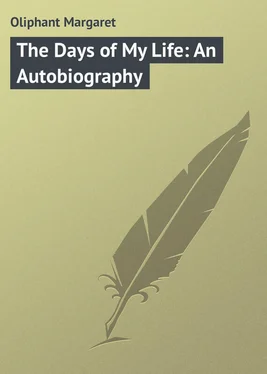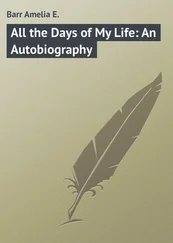Margaret Oliphant - The Days of My Life - An Autobiography
Здесь есть возможность читать онлайн «Margaret Oliphant - The Days of My Life - An Autobiography» — ознакомительный отрывок электронной книги совершенно бесплатно, а после прочтения отрывка купить полную версию. В некоторых случаях можно слушать аудио, скачать через торрент в формате fb2 и присутствует краткое содержание. ISBN: , Жанр: foreign_prose, на английском языке. Описание произведения, (предисловие) а так же отзывы посетителей доступны на портале библиотеки ЛибКат.
- Название:The Days of My Life: An Autobiography
- Автор:
- Жанр:
- Год:неизвестен
- ISBN:http://www.gutenberg.org/ebooks/43404
- Рейтинг книги:5 / 5. Голосов: 1
-
Избранное:Добавить в избранное
- Отзывы:
-
Ваша оценка:
- 100
- 1
- 2
- 3
- 4
- 5
The Days of My Life: An Autobiography: краткое содержание, описание и аннотация
Предлагаем к чтению аннотацию, описание, краткое содержание или предисловие (зависит от того, что написал сам автор книги «The Days of My Life: An Autobiography»). Если вы не нашли необходимую информацию о книге — напишите в комментариях, мы постараемся отыскать её.
The Days of My Life: An Autobiography — читать онлайн ознакомительный отрывок
Ниже представлен текст книги, разбитый по страницам. Система сохранения места последней прочитанной страницы, позволяет с удобством читать онлайн бесплатно книгу «The Days of My Life: An Autobiography», без необходимости каждый раз заново искать на чём Вы остановились. Поставьте закладку, и сможете в любой момент перейти на страницу, на которой закончили чтение.
Интервал:
Закладка:
We had turned into the alley, and I had been waiting for Mr. Osborne’s young acquaintance to leave us; but he walked on steadily at the other side, and showed no disposition to go away. I did not quite like answering Mr. Osborne’s questions before this stranger; he made me feel so strangely conscious of all my own words and movements. I no longer did anything easily, but became aware of every step I made.
“Have you not seen him since that night?” said I, “it is quite a long time ago.”
“ That night – so it did make some impression on my young debutante ,” said Mr. Osborne, with a smile. “Do you know I have been out of Cambridge for nearly three weeks, you forgetful young lady? Well, Hester, what of that night?”
“What of it, Mr. Osborne?” said I, with some little indignation. “I suppose there was nothing very extraordinary about it.”
Mr. Osborne laughed, and I was provoked. “There only was a crowd of people – there is nothing remarkable in a crowd,” said I, impetuously. “Why should I think about it – you do not suppose that I take a party like that for the world?”
“What do you call the world then, Hester?” said Mr. Osborne.
“I do not know,” said I, hesitating a little. “I cannot tell,” I repeated, after another pause, “but I suppose there is as much of it here as there was yonder . I think so, at least.”
“So that is the verdict of youth, is it?” said Mr. Osborne. “Henry, my boy, what say you?”
I could not help turning my head quickly towards him, but I did not raise my eyes; how I wondered what he would say.
“The party has sometimes more influence on a life than the street can have,” said the young man, with hesitation, “otherwise, I have no doubt, a thronged and busy street in London would look more like the world than a Cambridge drawing-room – but sometimes the drawing-room makes a greater mark in a life.”
“My good youth, you are less intelligible than Hester,” said Mr. Osborne, “but the young lady has no metaphysical bias that I know of, so we will not discuss the question. So we were very prosy, were we, the other night? and you were nearly smothered under the Professor’s shadow, and had nothing but pictures to look at, poor child! The next one will be better, Hester, do not be dismayed.”
I made no answer. I was piqued at Mr. Osborne’s mockery; but I wondered over what the other had said – what did he mean by the drawing-room making a mark in his life. Had it made any mark in mine? why should it? and why was he walking along so quietly by Mr. Osborne’s side, without the least intention of going away? I saw that he kept his eyes away from me, as carefully as I kept mine from him; but how I observed him for all that. His walk was rather slow and steady – he was not quick and impetuous as I was – I wanted to hasten on, for I was embarrassed a little, not knowing anything about “society,” and being quite at a loss to know whether I was acquainted with this stranger or not; but, of course, Mr. Osborne continued his leisurely pace, and so did his young companion. They made me impatient and almost irritated me; they went on so quietly.
When we came to the door, I opened it hastily, for it was an old-fashioned, unsuspicious door, and opened from the outside. Then in my awkwardness I went down the two steps which led from it, and stood below in the door, waiting for Mr. Osborne. I was in a little tremor of expectation – what was he going to do?
“I think I may presume on your father and yourself, Hester, so far as to ask my young friend to come in with me,” said Mr. Osborne, “for we have some business together. This is Mr. Harry Edgar, Miss Southcote – will you admit him within your precincts.”
Of course I had to make a little awkward bow to him, and I do not think his was much more graceful; and then I hurriedly led the way into the house. Mr. Osborne went directly to the library, and I called Alice to show Mr. Edgar up-stairs, then I ran to my own room to take off my bonnet. Must I go to the drawing-room where he was sitting alone – I thought it was very unpleasant – I felt extremely confused and awkward, yet I smoothed my hair, and prepared to go.
When I went into the room, he was looking at the pictures – those dark, hard panel portraits on the wall, and with some interest as I thought – though when I came, he, too, grew a little embarrassed like me. I went to my work-table immediately to look out some work, for I could not sit idle and talk to him. There were countless little bits of work lying half completed on my work-table, I had no difficulty in finding occupation, and when I had selected one, I sat down by the window and wished for Mr. Osborne. He ought to know better, than to leave me alone here.
There was nothing at all to keep us from the necessity of talking to each other, for he immediately gave up looking at the portraits, and the room was in fatal good order, and all the books put away. After the first awkward pause, he said something about the pictures: “they were family portraits, no doubt.”
“No,” said I, “that is, they are not Southcotes; they are portraits of grandmamma’s family, I suppose; but we always count our family on the other side.”
Then we came to another dead pause, and Mr. Edgar advanced to the window where I sat.
“How fresh and green your garden looks,” he said, after the fashion of people who must say something, “what a good effect the grass has – are there really blossoms on the trees? how early everything is this year!”
“We are well sheltered,” said I, in the same tone. “Our trees are always in blossom before our neighbors’.”
“And that is old Corpus,” he said, glancing out at the little gleaming windows of the College, “all this youth and life out of doors, contrasts strangely enough, I am sure, with the musty existence within.”
“The books may be musty, but I don’t think the existence is,” said I, rashly; “everybody ought to be happy that has something to do.”
“Yes. I always envy a hard student who has an object,” said Mr. Edgar, rather eagerly seizing upon this possibility of conversation – “he is a happy fellow who has a profession to study for, otherwise it is vanity and vexation of spirit.”
Now I had a strong instinct of contradiction in me – a piece of assertion always provoked me to resistance.
“I do not know how that can be,” said I. “I suppose Mr. Osborne only lives for his books, and his spirit shows very little vexation or vanity, and papa does nothing else but study, and cannot have any object in it – I fancy a good thing ought to be good for its own sake.”
“Mr. Osborne is a very busy man – he has a great many pursuits,” said my new friend, “he is not a fair example. We have an enthusiasm for books when we are young, and suck inspiration from them, and then we come back to them that they may deaden our own feelings and recollections after we have had a life of our own – when we are old.”
“You are not old, to be aware of that,” cried I, though I secretly thought that, at least, in my father’s case this might be true.
“I have lived a very solitary life,” he said, “which is almost as good as grey hairs.”
After that we paused again, very conscious of our silence, but finding conversation a very difficult matter. I was more at my ease than I had expected. I observed him, but not with the same intense observation. A person I knew by name, and spoke to in my father’s house, was a less mysteriously interesting person than the stranger who had attracted my notice so much, when all were strangers. At last, Mr. Edgar began to talk again – it was only to ask me if I had seen the great author who was at the party when he met me first – he did not say “had the pleasure to meet.”
Читать дальшеИнтервал:
Закладка:
Похожие книги на «The Days of My Life: An Autobiography»
Представляем Вашему вниманию похожие книги на «The Days of My Life: An Autobiography» списком для выбора. Мы отобрали схожую по названию и смыслу литературу в надежде предоставить читателям больше вариантов отыскать новые, интересные, ещё непрочитанные произведения.
Обсуждение, отзывы о книге «The Days of My Life: An Autobiography» и просто собственные мнения читателей. Оставьте ваши комментарии, напишите, что Вы думаете о произведении, его смысле или главных героях. Укажите что конкретно понравилось, а что нет, и почему Вы так считаете.












